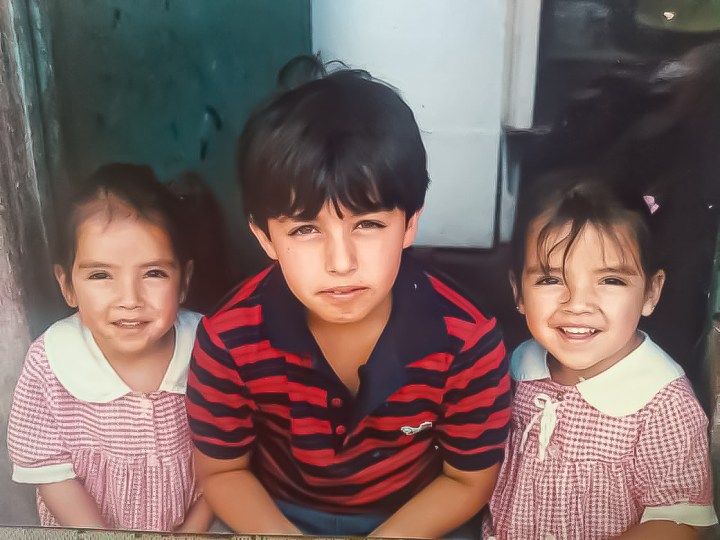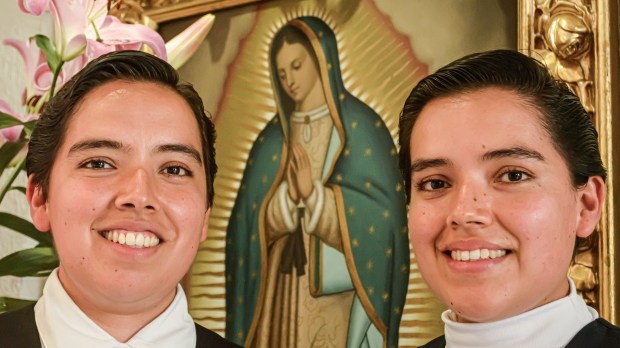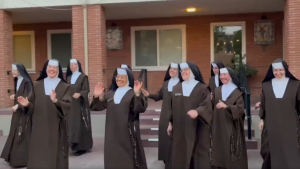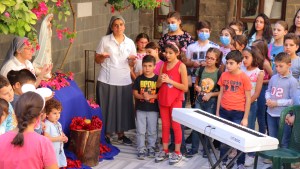Sisters Velma and Telma Vargas Santillan are twins. They were born in Morelia (in the state of Michoacán, Mexico) on November 9 into a Catholic family. Today they live in the state of Guanajuato, the territory of a fierce war between different drug cartels.
One of them lives in Celaya and the other in Leon, both of them in leadership positions in schools run by their congregation.
Now 38 years old, they’ve been in religious life for more than 17 years. They felt God’s call to consecrate themselves at a very early age.
They belong to the congregation of the Daughters of Mary Immaculate of Guadalupe, a congregation founded by the Catholic priest José Antonio Plancarte y Labastida, and this is part of their story, as shared in an interview with Aleteia (abridged and adapted for brevity).
The beginning of God’s call
At what age did you experience the call to religious life?
Velma: We were students at a school run by the congregation of sisters to which we now belong. We studied at the Plancarte School in Morelia, and from a very young age I was attracted by the community.
I think it had a lot to do with the fact that when we were 10 years old I was in fifth grade and we had a car accident. I was immobilized for a long time, and at that moment I became aware that life is short, that life must be used for something worthwhile, that God accompanies us and gives us life so we can do something good and not waste it.
When I heard that in religious life you have to consecrate your whole life to God, I thought, “The most important thing is God and the most valuable thing we can do is to consecrate our life to Him.”
In prayer I began to realize that God was really calling me. It’s like a certainty, a desire to give everything to God, specifically in religious life.
Telma: When she began to feel called to something more, we were very young. So when she was 14 years old and said she was leaving to join the sisters, it was inconceivable to me and I convinced her to stay until after high school.
Then, when we entered high school, she and I started going to vocational days and, from the first event, I said I wanted to do something like that. We were in high school for the whole three years, and went on missions and started to be catechists.
During moments of prayer on retreats is when you discover how great God is. You discover the infinite and you say, “This fills me so much that I can’t say ‘no’ to something so great.”
When I decided to join the sisters, I was still very resistant to the idea because I didn’t want to separate from my family; I didn’t want to leave my mother. It seemed impossible to me. But for God nothing is impossible, because He gives us grace. We entered at the age of 17.
What was it like for your parents when they found out that you were choosing religious life?
Telma: For my parents it was a very hard blow, not because they weren’t religious or believe in God, but because of the separation. To this day they think it was too soon or that it was too radical, because when you decide to leave, you go and separate yourself somewhat from your family. For our parents it was very, very hard because we both went at the same time.
Velma: I think one of the hardest days of my life was when we told my parents. It was very difficult, because we knew what it was going to be like for them. We were very close as a family. It was quite a few years before they accepted it, but I do understand how hard it was for them.

Vocation crises in the world
What do you think about the vocation crisis?
Velma: I believe that the most important vocation crisis is not in religious life, but in marriage and the family. If there’s no spiritual life in families, if there’s no love, if there are fractured marriages, if marriage is degraded, if there are few vocations in the consecrated life, I dare say that there are fewer in marriage, because the fact of going to live together does not make it a marriage.
Telma: Monsignor Diego Monroy told us that there isn’t a crisis of vocations in the sense of God not calling people, but rather there is a crisis of response, because of all this bombardment from the media and culture. For many young people, God is no longer at the center.
A life of chastity
How do you live chastity?
Velma: Thinking that chastity means renouncing love means having no idea what chastity is. We do not renounce love; on the contrary, we unite ourselves to a greater love, to a deeper intimacy, to a relationship to which we are all called since baptism.
We are all called to live chastity according to our state in life, even spouses. Because chastity is not a renunciation; chastity means putting things in order, and in this case, it means putting order in the great gift of sexuality that God gave us, always putting first things first.
And that doesn’t mean that we don’t have temptations, but the best way to face them is with all the means that the Church has given us, such as the Holy Mass and having someone to whom I can tell what is happening to me, as well as having healthy distractions.
Telma: I can’t say that it’s very easy and that everything has been very lovely, because it wouldn’t be true. I think that it’s worthwhile precisely because it is such a challenge. Even with all the weaknesses and miseries we have, God’s mercy in us is so great that it has allowed us to be here, saying, “It can be done, it can still be done.”
When young people tell me that the church is archaic, I tell them that there is nothing more archaic than the lower passions of humanity. It was Christ who came to give meaning to love.
A war against sexual licentiousness and gender ideology
What measures, in terms of education, are being taken to counteract this?
Velma: It’s very striking to hear children listening to Bad Bunny songs that are so vulgar, and they listen to them without due preparation. In addition, the family is attacked in textbooks, which promote ideas against the commandments of God’s law. As Christians we should be concerned.
It’s difficult because there are too many fronts. We’re in the educational system and we can do a little, we orient the children, but how can we protect them from movies and television? We try to talk with their parents to update them on what’s happening with their children.
Telma: In general, we try to form the heart. This attack is coming at us in a very strong way. Maybe in the past years it was very indirect, but in the last two years this ideology has become quite open and blatant, even an imposition.
It is and will be a task that will imply a very big challenge because we cannot stand by with our arms crossed.
It’s a daily task, but it isn’t easy. And since the social pressure is so strong, it will be a great challenge for us to make them know the truth that God has put in our hearts about what is right and what is wrong.
Anything you would like to conclude with?
Velma: Values and the truth will always be the same. Let us remember the saying: “What is wrong is wrong even if everyone does it, and what is right is right even if no one does it.”



